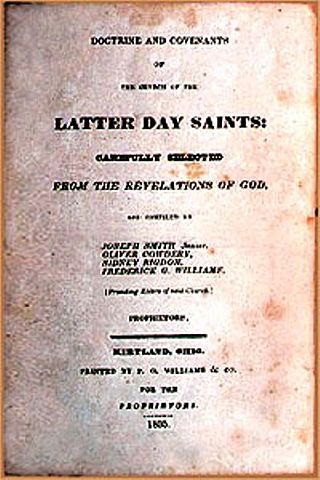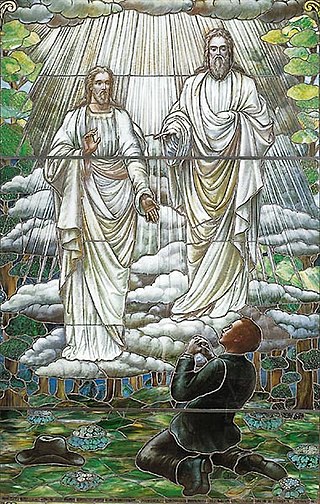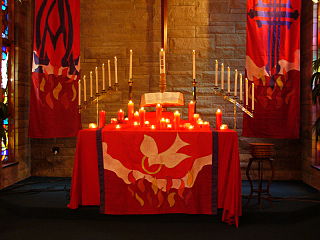
Divinity or the divine are things that are either related to, devoted to, or proceeding from a deity. What is or is not divine may be loosely defined, as it is used by different belief systems.

Mormonism is the religious tradition and theology of the Latter Day Saint movement of Restorationist Christianity started by Joseph Smith in Western New York in the 1820s and 1830s. As a label, Mormonism has been applied to various aspects of the Latter Day Saint movement, although there has been a recent push from the Church of Jesus Christ of Latter-day Saints to distance themselves from this label. A historian, Sydney E. Ahlstrom, wrote in 1982, "One cannot even be sure, whether [Mormonism] is a sect, a mystery cult, a new religion, a church, a people, a nation, or an American subculture; indeed, at different times and places it is all of these." However, scholars and theologians within the Latter Day Saint movement, including Smith, have often used "Mormonism" to describe the unique teachings and doctrines of the movement.

"The Family: A Proclamation to the World" is a 1995 statement issued by the Church of Jesus Christ of Latter-day Saints which defined the official position of the church on family, marriage, gender roles, and human sexuality. It was first announced by church president Gordon B. Hinckley.

Nontrinitarianism is a form of Christianity that rejects the mainstream Christian doctrine of the Trinity—the belief that God is three distinct hypostases or persons who are coeternal, coequal, and indivisibly united in one being, or essence. Certain religious groups that emerged during the Protestant Reformation have historically been known as antitrinitarian.

In the Church of Jesus Christ of Latter-day Saints, the Holy Sacrament of the Lord's Supper, most often simply referred to as the sacrament, is the ordinance in which participants eat bread and drink water in remembrance of the body and blood of Jesus Christ. Normally, the sacrament is provided every Sunday as part of the sacrament meeting in each LDS Church congregation.

"Lectures on Faith" is a set of seven lectures on the doctrine and theology of the Church of Jesus Christ of Latter Day Saints, first published as the doctrine portion of the 1835 edition of the canonical Doctrine and Covenants (D&C), but later removed from that work by both major branches of the faith. The lectures were originally presented by Joseph Smith to a group of elders in a course known as the "School of the Prophets" in the early winter of 1834–35 in Kirtland, Ohio.
In orthodox Mormonism, the term God generally refers to the biblical God the Father, whom Latter Day Saints refer to as Elohim, and the term Godhead refers to a council of three distinct divine persons consisting of God the Father, Jesus Christ, and the Holy Ghost. However, in Latter Day Saint theology the term God may also refer to, in some contexts, the Godhead as a whole or to each member individually. Latter Day Saints believe that the Father, Son, and Holy Ghost are three distinct beings, and that the Father and Jesus have perfected, glorified, physical bodies, while the Holy Ghost is a spirit without a physical body. Latter Day Saints also believe that there are other gods and goddesses outside the Godhead, such as a Heavenly Mother—who is the wife of God the Father—and that faithful Latter-day Saints may attain godhood in the afterlife. The term Heavenly Parents is used to refer collectively to the divine partnership of Heavenly Father and a Heavenly Mother. Joseph Smith taught that God was once a man on another planet before being exalted to Godhood.
Agency, in the theology of the Church of Jesus Christ of Latter-day Saints, is "the privilege of choice which was introduced by God the Eternal Father to all of his spirit children in the premortal state". Mortal life is viewed as a test of faith, where our choices are central to the plan of salvation in Latter-day Saint teaching. "It was essential for their eternal progression that they be subjected to the influences of both good and evil". LDS Church members believe that Lucifer rebelled against the God's plan, which resulted in a war in heaven, and Lucifer being cast out of heaven and becoming Satan.

In the Latter Day Saint movement, confirmation, is an ordinance essential for salvation. It involves the laying on of hands and is performed after baptism. Through confirmation, the initiate becomes an official member of the church and receives the gift of the Holy Ghost. Baptism and confirmation are administered to persons at least eight years old. The ordinance corresponds to the confirmation rite in many other Christian faiths. Confirmations were first performed on April 6, 1830, at the organizational meeting of the Church of Christ.
A spirit body is, according to the Church of Jesus Christ of Latter-day Saints, the organization of a spiritual element, made into the spiritual form of man, which was made in the same likeness of God the Father. This likeness apparently gave rise to the phrase and meaning of, "like father like son," which means the son is in the likeness of the father, which provides meaning to the claim that humanity was made in the likeness of God. Generally, people in the world have commonly used the word "soul" to denote this spirit body.

In Christian theology, the incarnation is the belief that the pre-existent divine person of Jesus Christ, God the Son, the second person of the Trinity, and the eternally begotten Logos, took upon human nature and "was made flesh" by being conceived in the womb of a woman, the Virgin Mary, also known as the Theotokos. The doctrine of the incarnation then entails that Jesus was at the same time both fully God and fully human—two natures in one person.
For members of the Church of Jesus Christ of Latter-day Saints, prayer is a means of communicating with God. Such communication is considered to be two-way, with the praying individual both expressing thoughts to God and receiving revelation, or communication from God, in return. As such, individuals who pray privately often include time to listen and ponder, during or after a prayer is uttered. Communication from God is received through the Holy Ghost, which speaks to the mind and heart of an individual. Prayer is one of the central teachings of the church, and adherents believe that they are commanded to pray often. The LDS Church teaches that humankind has been commanded to pray since its first generation. There are no restrictions as to who can pray, and the LDS Church teaches that all should pray and that God hears and listens to all prayers. Members are taught to begin to pray from a young age, and young children are sometimes asked to offer public prayers. Individuals who are not members of the LDS Church are also encouraged to pray both publicly and privately.
In Mormonism, revelation is communication from God to man. Latter Day Saints teach that the Latter Day Saint movement began with a revelation from God, which began a process of restoring the gospel of Jesus Christ to the earth. Latter Day Saints also teach that revelation is the foundation of the church established by Jesus Christ and that it remains an essential element of his true church today. Continuous revelation provides individual Latter Day Saints with a "testimony", described by Richard Bushman as "one of the most potent words in the Mormon lexicon".
In the Church of Jesus Christ of Latter-day Saints, the priesthood is the power and authority to act in the name of God for the salvation of humankind. Male members of the church who meet standards of worthy behavior and church participation are generally ordained to specific offices within the priesthood.

Mormon cosmology is the description of the history, evolution, and destiny of the physical and metaphysical universe according to Mormonism, which includes the doctrines taught by leaders and theologians of the Church of Jesus Christ of Latter-day Saints, Mormon fundamentalism, the Restoration Church of Jesus Christ, and other Brighamite denominations within the Latter Day Saint movement. Mormon cosmology draws from Biblical cosmology, but has many unique elements provided by movement founder Joseph Smith. These views are not generally shared by adherents of other Latter Day Saint movement denominations who do not self-identify as "Mormons", such as the Community of Christ.
Members of the Church of Jesus Christ of Latter-day Saints and other adherents in the Latter Day Saint movement, believe that there will be a Second Coming of Jesus Christ to the earth sometime in the future. The LDS Church and its leaders do not make predictions of the actual date of the Second Coming.

In the Latter Day Saint movement, baptism is recognized as the first of several ordinances (rituals) of the gospel.

The Church of Jesus Christ of Latter-day Saints focuses its doctrine and teaching on Jesus Christ; that he was the Son of God, born of Mary, lived a perfect life, performed miracles, bled from every pore in the Garden of Gethsemane, died on the cross, rose on the third day, appeared again to his disciples, and now resides, authoritatively, on the right hand side of God. In brief, some beliefs are in common with Catholics, Orthodox and Protestant traditions. However, teachings of the LDS Church differ significantly in other ways and encompass a broad set of doctrines, so that the above-mentioned denominations usually place the LDS Church outside the bounds of orthodox Christian teaching as summarized in the Nicene Creed.

Christian denominations have variations in their teachings regarding the Holy Spirit.
Exaltation is a belief among members of the Church of Jesus Christ of Latter-day Saints that mankind can reach the highest level of salvation, to eternally live in God's presence, continue as families, become gods, create worlds, and have spirit children over which they will govern. Church leaders have taught God wants exaltation for all humankind and that humans are "gods in embryo". The church teaches that through exaltation believers may become joint-heirs with Jesus Christ as stated in Romans 8:17 and Revelation 21:7. The objective of adherents is to strive for purity and righteousness and to become one with Jesus as Jesus is one with God the Father. A verse in the canonized Doctrine and Covenants states that those who are exalted will become gods, and a 1925 statement from the church's highest governing body said that "All men and women are in the similitude of the universal Father and Mother ... [and are] capable, by experience through ages and aeons, of evolving into a God." A popular Mormon quote—often attributed to the early apostle Lorenzo Snow in 1837—is "As man now is, God once was: As God now is, man may be."